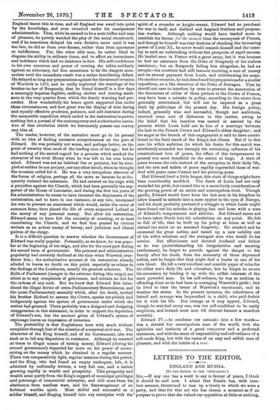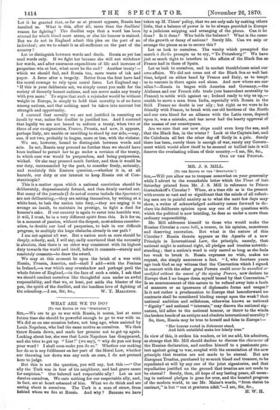LETTERS TO THE EDITOR.
ENGLAND AND RUSSIA.
[To THE EDITOR OF THE .EPECTATOR.1
SiR,—If any one has a word to say in favour of peace, I think it should be said now. I admit that Russia has, with inso- lent manner, threatened to tear up a treaty to which we were a party, and that for this act she has chosen a moment as if on purpose to prove that she valued our opposition at little or nothing. Let it be granted that, as far as at present appears, Russia has insulted us. What is this, after all, more than the duellists' reason for fighting? The duellist says that a word has been uttered for which blood must atone, or else his honour is stained. But we do not in England admit this plea on the part of an individual ; are we to admit it as all-sufficient on the part of the country ?
Let us distinguish between words and deeds. Russia as yet has used words only. If we fight her because she will not withdraw her words, and after enormous expenditure of life and increase of pauperism win at last, what must be the end? Another treaty! — which we should feel, and Russia too, mere waste of ink and paper. A farce after a tragedy. Better from the first have had the moral courage to rely upon moral force. Let England say : If this is your deliberate act, we simply count you unfit for the society of decently honest nations, and can never make any treaty with you more.' To argue that such a rejoinder would be without weight in Europe, is simply to hold that morality is of no force among nations, and that nothing need be taken into account but strength and opportunity.
I contend that morally we are not justified in resenting an insult by war, unless the duellist is justified too. And I contend that legally we are not bound to enforce a treaty, when two or three of our co-signatories, France, Prussia, and now, it appears, perhaps Italy, are unable or unwilling to stand by our side,—nay, one, if not two, probably in league, more or less, with the violater.
We are, however, bound to distinguish between words and acts. In act, Russia may proceed no further than we should have been inclined to permit her to go under a revision of the treaty, in which case war would be purposeless, and being purposeless, wicked. Or she may proceed much further, and then it would be our duty, untrammeled by the past, to consider freely, seriously, and resolutely this Eastern question,—whether it is, at all hazards, our duty or our interest to keep Russia out of Con- stantinople?
This is a matter upon which a national conviction should be deliberately, dispassionately formed, and then firmly carried out. But many of the journals (I do not of course include the Spectator) are not deliberating,—they are setting themselves, by writing at a white heat, to lash the nation into fury,—they are urging it to avenge an insult, to maintain its prestige, to fight a duel for honour's sake. If our country is again to enter into horrible war, it will, I trust, be in a very different spirit from this. Is it for us, in a moment of passion, without the deepest, most solemn consider- ation, to double our load of pauperism, to halt in our difficult progress, to multiply the huge obstacles already in our path ?
I am not against all war. But a nation such as ours should be deeply, soberly, and, I will say, sadly convinced that the necessity is absolute, that there is no other way consistent with its highest duty towards the world and itself, before it consents—sternly and resolutely consents—to draw the sword.
We may at this moment be upon the brink of a war with Russia, Prussia, America, and—shall I add—with the Fenians in Ireland,—a war which may overshadow and perhaps' peril the whole future of England,—in the face of such a crisis, I ask that we should conduct ourselves like thoughtful men under an awful responsibility, and that we, at least, put aside the bluster of the pen, the spirit of the duellist, and the heedless love of fighting of



































 Previous page
Previous page